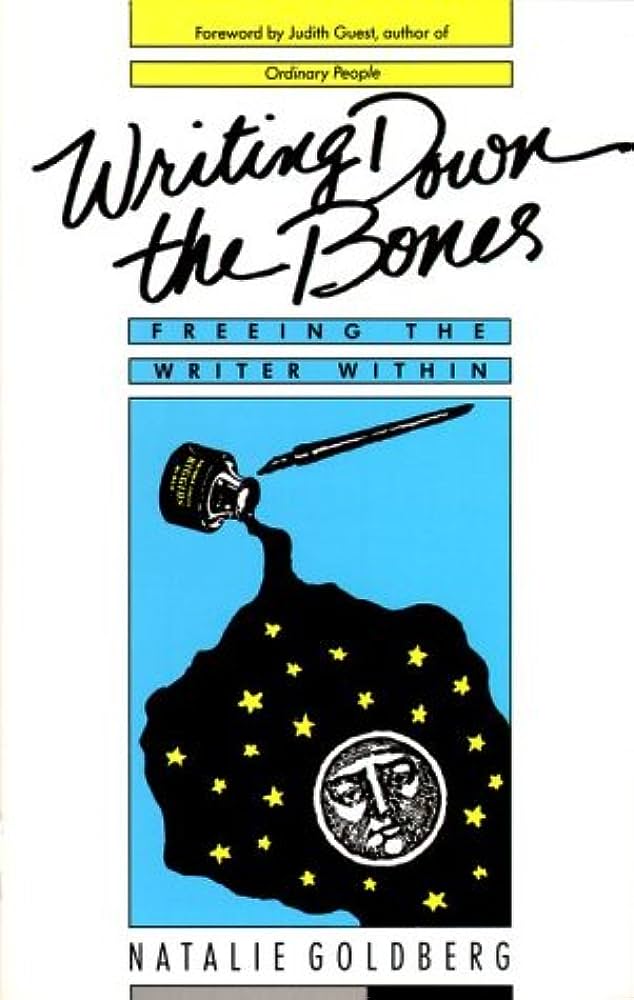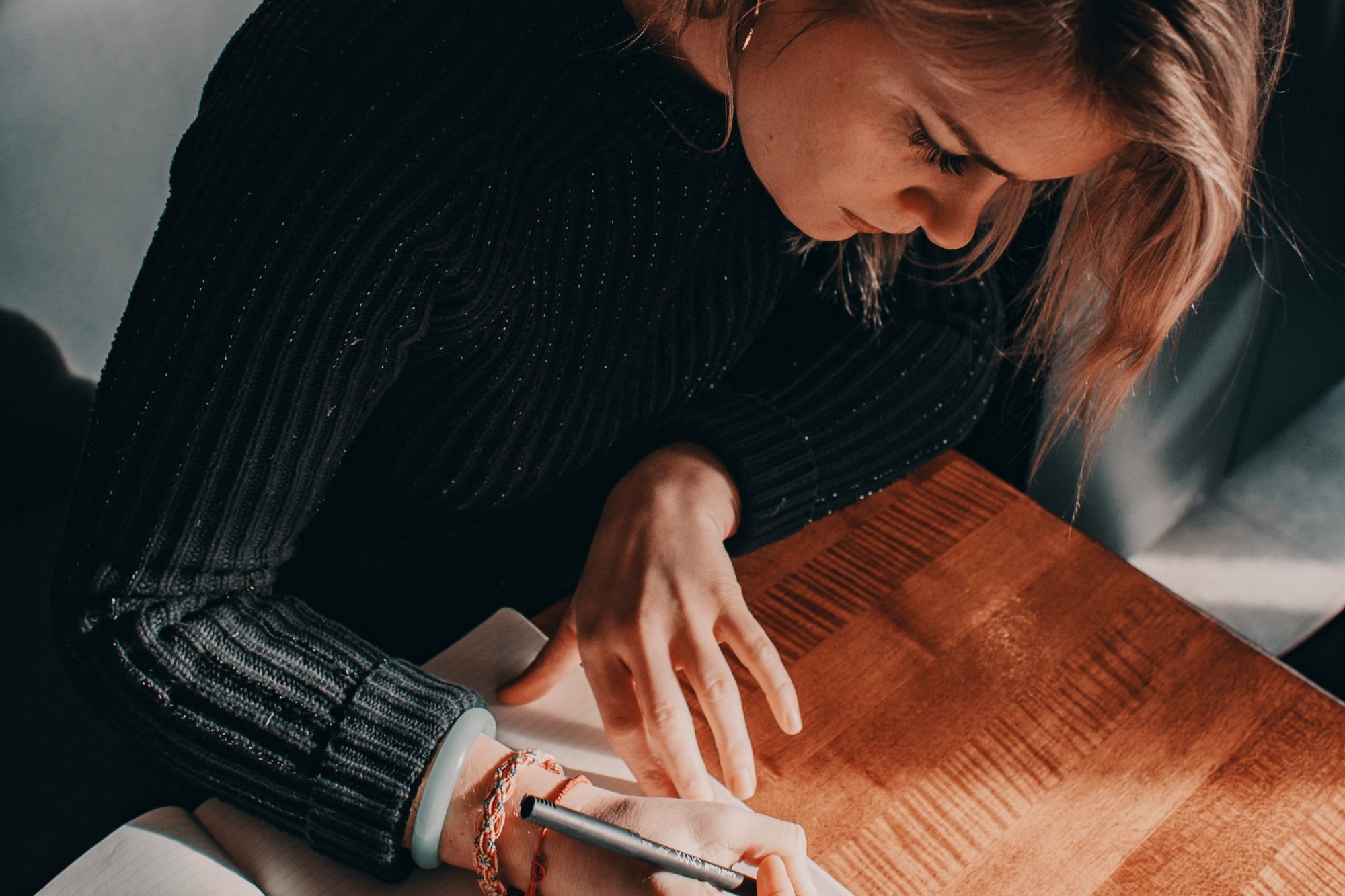“How do I know how hard to push? How much is enough?”, I ask my coach. “In coaching, and in life.” Words from a long time ago, weighed down by the urgency of placing a few full stops in between the endless question marks. Coordinates on maps still to be created.
Then at the beginning of summer, lying on a shared-flat-couch above the roofs of Warsaw, Natalie Goldberg makes me find one of the answers to the question. Natalie is the author of “Writing Down the Bones”, the 1986 classic guide on creating a writing practice that has inspired writers for decades. With an understanding of what it means to be a writer, and advice that I fully subscribe to based on my own lived experience.
The answer:
“Push yourself beyond when you think you are done with what you have to say. Go a little further. Sometimes when you think you are done, it is just the edge of beginning. Probably that’s why we decide we’re done. It’s getting too scary. We are touching down onto something real. It is beyond the point when you think you are done that often something strong comes out.”
Don’t stop before you’ve started.
Let’s look at a few scenarios: You think “I want to write better”, and might harbor some secret big dreams along with it. You think ”anyone can write”, and what’s this cult around writers anyway? You have a writer in your circle, and want to figure out if they’re “crazy” or just being a…writer? You’ve come till here and have nothing better to do? Then do read on.
This is the best writing advice that I ever got:

🟠 LIVE TWICE: “Writers live twice. They go along with their regular life, are as fast as anyone in the grocery store, crossing the street, getting dressed for work in the morning. But there’s another part of them that they have been training. The one that lives everything a second time. That sits down and sees their life again and goes over it. Looks at the texture and details.”
🟠 PRETEND YOU KNOW: “Don’t be afraid to answer the questions. You will find endless resources inside yourself. Writing is the act of burning through the fog in your mind. Don’t carry the fog out on paper. Even if you are not sure of something, express it as though you know yourself. With this practice you eventually will. (oh why does this remind me of coaching so much? :))
🟠 BELIEVE IN DETAILS: “We are important and our lives are important, magnificent really, and their details are worthy to be recorded. This is how writers must think, this is how we must sit down with pen in hand. We were here; we are human beings; this is how we lived.” & “Writers write about things that other people don’t pay much attention to..A writer’s job is to make the ordinary come alive, to awaken ourselves to the specialness of simply being.”
🟠 PRACTISE BEING DUMB: “In a rainstorm, everyone quickly runs down the street with umbrellas, raincoats, newspapers over their heads. Writers go back outside in the rain with a notebook in front of them and a pen in hand. They look at the puddles, watch them fill, watch the rain splash in them. You can say a writer practices being dumb. Only a dummy would stand out in the rain and watch a puddle.”
🟠 LEARN THE NAMES: “Learn the names of everything: birds, cheese, tractors, cars, buildings. A writer is all at once everything – an architect, French cook, farmer – and at the same time, a writer is none of these things.” I would add, make the language you carry inside rich & flexible. So it can carry you wherever you want to go.
🟠 USE LONELINESS: “Art is communication. Taste the bitterness of isolation, and from that place feel a kinship and compassion for all people who have been alone. Then in your writing lead yourself out of it by thinking of someone and wanting to express your life to him. Reach out in your writing to another lonely soul. “This is how I felt when I drove across Nebraska, late August, early evening alone in my blue car.” Use loneliness. Its ache creates urgency to reconnect with the world. Take that aching and use it to propel you deeper into your need for expression–to speak, to say who you are and how you care about light and rooms and lullabyes.” Who you are, how you care.
🟠 MODEL THE EXPERTS: “Tony Robbins, the fire-walker, says that when you want to learn something, go to experts who have put in thirty years and learn from them. Study their belief systems, their mental syntax – the order in which they think- and their physiology, how they stand, breathe, hold their mouth when they do the task they are expert in. In other words, model them. So when you go to break wood, you are not you, you are the black belt in karate that you have been modeling, and your hand does not stop at wood but goes through it.”
🟠 FALL IN LOVE WITH WRITERS: “Writers are great lovers. They fall in love with other writers. That’s how they learn to write. They take on a writer, read everything by him or her, read it over again until they understand how the writer moves, pauses, and sees. That’s what being a lover is: stepping out of yourself, stepping into someone else’s skin. Your ability to love another’s writing means those capabilities are awakened in you. It will only make you bigger; it won’t make you a copy cat. The parts of another’s writing that are natural to you will become you, and you will use some of those moves when you write. But not artificially. Great lovers realize that they are what they are in love with.”
🟠 BEGIN WITH YOURSELF: “Always begin with yourself and let that carry you. Sometimes you need to begin far away from the answer and then down-spiral back to it. Writing is the act of discovery. You want to discover your relationship with a topic, not the dictionary definition.” & “He had given himself a lot of space. If you begin too exactly, you will stay precise but never hit the exact mark that makes the words vibrate with the truth that goes through the present, past and future.”
🟠 BE HONEST & GO ON: “Be willing to look at your work honestly. If something works, it works. If it doesn’t, quit beating an old horse. Go on writing. Something else will come up. There’s enough bad writing in the world. Write one good line, you’ll be famous. Write a lot of lukewarm pieces, you’ll put people to sleep.”
🟠 REMEMBER DIGNITY: “You can’t go deep into your writing and then step out of it, clamp down, go home, “be nice,” and not speak the truth. If you give yourself over to honesty in your practice, it will permeate your life. You can’t straighten up during writing and then hunch back down when you let go of the pen. Writing can teach us the dignity of speaking the truth, and it spreads out from the page into all of our life, and it should. Otherwise, there is too much of a schism between who we are as writers and how we live our daily lives. That is the challenge: to let writing teach us about life and life about writing. Let it flow back and forth.”
🟠 REMEMBER FREEDOM: “The life of the artist isn’t easy. You are never free unless you are doing your art…Freedom means knowing who you are, what you are supposed to be doing on this earth, and then simply doing it…Writing gives you a great opportunity to swim through to freedom.”
🟠 REMEMBER YOU’RE NOT YOUR WORK: “There is no permanent truth you can corner in a poem that will satisfy you forever. Don’t identify too strongly with your work. Stay fluid behind those black-and-white words. They are not you. They were a great moment going through you. A moment you were awake enough to write down and capture.”
➜ “WRITE UNTIL YOU’RE SPENT.”
And do remember the big picture (imo also true for great content on social media!): “A responsibility of literature is to make people awake, present, alive.”
And: “We should never underestimate people. They do desire the cut of truth.”
So, what’s your relationship with writing now?

(Cover image: Marcos Paulo Prado on Unsplash)
Hi! Besides being an aspiring coach, I’m a comms professional and creative for social impact. On my CV, I have life experience in leadership. Off it, I know about some hard edges of life. Through it all, I write to connect the dots and help bring out the best in people.
Reach out via LinkedIn or Email if you’re now feeling a tingle of connection, excitement, thirst for more. Or go back to the Blog to keep exploring.

